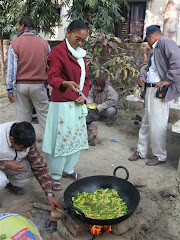The very hungry caterpillar has been a great success with ECD at two schools. The children love the story and all have made a caterpillar segment with their names, weight, favourite things. Its been a brilliant way of getting them to talk individually.
Primary and secondary training programmes have finished, with great celebrations, and we have started workshops for school based training. Some secondary teachers have done some interesting action research projects, with enticing titles like ‘stopping students fleeing after tiffin’. Many children do not reappear after the break, as they often work in the fields. One ingenious solution was setting up a committee to fine students 5 rupees (stick not carrot) – but it worked and over 200 rupees was collected and spent on a rubbish bin and broom to keep the classroom clean. Not very Nepali. I watched a group of 100 on Friday eating their tiffin – samosa, gulab jamon and banana – then tossing the cardboard plate, banana skin and other debris over the balcony, out of the window or onto the grass. This was followed by a hearty bout of throat clearing and spitting.
I have been visiting rural schools on the back of Durga’s motorbike. Several days were foggy and damp and we slid along buffalo tracks through fields of rice stubble to rural schools where teachers muffled up in scarves, jackets and woolly hats taught chilly students with ragged shirts and bare feet as water dripped from the tin roof. Poverty seems so much worse in the cold. On the way back from one school, we went to his parents, who have recently sold their land in the village and have bought land and are in the process of having a new house constructed on the outskirts of the city. The ground floor is completed; we found his elderly parents sitting on a pile of rubble on the roof, watching as women toiled up the rudimentary concrete stairs balancing piles of bricks on their heads, while men with makeshift plumblines assembled the bricks for the upstairs walls. Outside were the 2 family cows and a well planted vegetable garden.
By Friday, the sunshine had returned and we had a glorious day in the countryside. We sped along the highway past silent factories and busy brick kilns. The mustard fields are brilliant yellow, amongst wheat, maize and sugarcane. Kingfishers wait patiently on the bamboo overhanging the river. Oxen are ploughing the rice stubble and. women are threshing rice and drying pulses. Every house has its own Monet-like haystack. Eventually we nearly reached Rangeli, where Durga wanted to show me his old wooden house and former school, but there was a banda, with the road blocked by burning tyres, so we walked the last kilometer. We met many teachers from the training programmes, but no teaching was happening as the students were preparing for Saraswati the goddess of education) puja on Saturday. Brightly coloured flags were being strung across the school compound and a ‘temple’ prepared for a clay statue of the goddess. We had passed many of these on the road, being transported by rickshaw and buffalo.
Saturday morning – misty again as we cycled to Bokhari school with Hanna and the boys for their celebration. All the children and staff were there, with many ex-students and people from the local community. Two village bands were playing and local men had brought 3 goats for ritual slaughter by the Hindu priest in banana yellow robes. A classroom had been made into a Saraswati temple and we paraded through to do puja and receive our tikkas. Huge vats of food were being cooked for a village feast, followed by singing and dancing. Tomorrow we will follow the processions to the river where the stautes will be cast into the water. Lovely for all of us to enjoy the festivals while there is no improvement in the political situation. This week even the smugglers have gone on strike and there is no improvement in the power situation, inspite of the PM’s promises.
Next week to Kathmandu and then to India for a long overdue break in Kerala.
.jpg)
.jpg)







.jpg)
.jpg)
.jpg)
















.jpg)



















